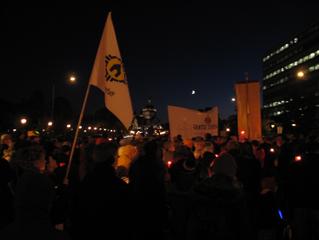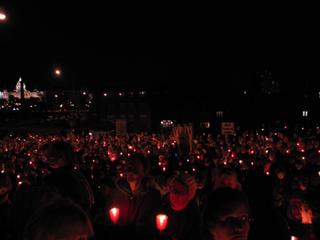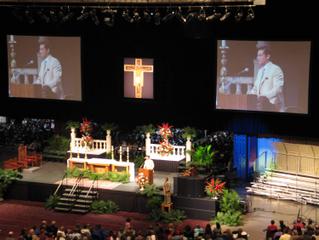And With That...
I'm off for another weekend of classes and spiritual enrichment. As of 12:30 last night, all my papers are done. There's happiness all around, especially since this time my beloved wife is joining me for the trip...
Lumen Fidei"The Light of Faith"
|
|
I'm off for another weekend of classes and spiritual enrichment. As of 12:30 last night, all my papers are done. There's happiness all around, especially since this time my beloved wife is joining me for the trip...
We studied a few biblical examples of conversion, such as that of St. Paul & St. Peter. But the one that really jumped out at me was the conversion of King David.
And David said to Saul, "Why do you listen to the words of men who say, 'Behold, David seeks your hurt'? Lo, this day your eyes have seen how the LORD gave you today into my hand in the cave; and some bade me kill you, but I spared you. I said, 'I will not put forth my hand against my lord; for he is the LORD'S anointed.' See, my father, see the skirt of your robe in my hand; for by the fact that I cut off the skirt of your robe, and did not kill you, you may know and see that there is no wrong or treason in my hands. I have not sinned against you, though you hunt my life to take it. May the LORD judge between me and you, may the LORD avenge me upon you; but my hand shall not be against you. As the proverb of the ancients says, 'Out of the wicked comes forth wickedness'; but my hand shall not be against you. After whom has the king of Israel come out? After whom do you pursue? After a dead dog! After a flea! May the LORD therefore be judge, and give sentence between me and you, and see to it, and plead my cause, and deliver me from your hand." 1 Sam 24:9-14
Then the king said to Zadok, "Carry the ark of God back into the city. If I find favor in the eyes of the LORD, he will bring me back and let me see both it and his habitation; but if he says, 'I have no pleasure in you,' behold, here I am, let him do to me what seems good to him. -2 Sam 15:25-26and
And David said to Abi'shai and to all his servants, "Behold, my own son seeks my life; how much more now may this Benjaminite! Let him alone, and let him curse; for the LORD has bidden him. It may be that the LORD will look upon my affliction, and that the LORD will repay me with good for this cursing of me today." -2 Sam 16:1-12Notice the difference. Before his conversion, David is very confident, almost to the point of being "cocky." He does nothing wrong, but he clearly is presuming upon God to ensure that favorable outcomes will always be bestowed upon him. What is really lacking is his humility.
And the LORD sent Nathan to David. He came to him, and said to him, "There were two men in a certain city, the one rich and the other poor. The rich man had very many flocks and herds; but the poor man had nothing but one little ewe lamb, which he had bought. And he brought it up, and it grew up with him and with his children; it used to eat of his morsel, and drink from his cup, and lie in his bosom, and it was like a daughter to him. Now there came a traveler to the rich man, and he was unwilling to take one of his own flock or herd to prepare for the wayfarer who had come to him, but he took the poor man's lamb, and prepared it for the man who had come to him." Then David's anger was greatly kindled against the man; and he said to Nathan, "As the LORD lives, the man who has done this deserves to die; and he shall restore the lamb fourfold, because he did this thing, and because he had no pity." Nathan said to David, "You are the man. Thus says the LORD, the God of Israel, 'I anointed you king over Israel, and I delivered you out of the hand of Saul; and I gave you your master's house, and your master's wives into your bosom, and gave you the house of Israel and of Judah; and if this were too little, I would add to you as much more. Why have you despised the word of the LORD, to do what is evil in his sight? You have smitten Uri'ah the Hittite with the sword, and have taken his wife to be your wife, and have slain him with the sword of the Ammonites. Now therefore the sword shall never depart from your house, because you have despised me, and have taken the wife of Uri'ah the Hittite to be your wife.' Thus says the LORD, 'Behold, I will raise up evil against you out of your own house; and I will take your wives before your eyes, and give them to your neighbor, and he shall lie with your wives in the sight of this sun. For you did it secretly; but I will do this thing before all Israel, and before the sun.'" David said to Nathan, "I have sinned against the LORD." -2 Sam 12:1-13
If you're not familiar with the work of Barbara Nicolosi, you should be. Really.
I spent my twenties as a member of the Daughters of St. Paul. As a congregation dedicated to evangelization with the media, I spent countless hours during those years, in front of the Blessed Sacrament, praying for the media and for media makers. Also, trying to stay awake, by the way. I am very grateful for those years. They seem to me now to be some kind of extended retreat that I needed to brood over all of the themes that come into play everyday in my work now in Hollywood.
I left the Daughters after a kind of Sound of Music scene with my Provincial Superior. She crying and saying "Barbara, you are a hard person to send away, but we think God is calling you somewhere else." And me crying saying, "I'll change. I'll change. Don't make me go!" But inside, I was actually relieved. Really.
It's served me well to have gone through that whole trauma-and it was traumatic. It's given me a profound sense of inner shrug that gets me through otherwise daunting challenges. When you've been thrown out of the convent during the worst vocation crisis in the history of the Church, what else can the world do to you?
Interesting (and hopeful) article from cwnews.com:
Oct. 21 (FIDES/CWNews.com) - The world's Catholic population increased by over 15 million in 2003 (the last year for which full statistics are available), according to figures compiled by the Fides news service. The number of Catholics grew significantly on every continent but Europe, where it fell by 214,000.The rest of the article is here.
You've probably noticed already, but the JPII quote of the day has fallen by the wayside over the past few weeks. I had a nice stack of them all lined up, but ran out, and haven't been working on JPII homework since then. Now I'm obviously back to JPII homework, and so hopefully will have a few lined up again, time permitting.
Man cannot live without love. He remains a being that is incomprehensible for himself, his life is senseless, if love is not revealed to him, if he does not encounter love, if he does not experience it and make it his own, if he does not participate intimately in it.
-Redemptor Hominis
Today is Monday, October 17. Friday (October 21) I leave for my next round of classes. Between now and Thursday evening, I have 13 pages' worth of papers to write, of which I've completed 2 so far. All for Professor Bushman. (See this post for an example of his expectations for our submissions.) Currently, I'm working on an assignment entitled:
Present a summary and synthesis of the Pope's (JPII) teaching by showing how human dignity, moral conscience, and redemption are related. Be sure to define human dignity, redemption and conscience and answer questions such as:
What is the foundation of human dignity?
How can human dignity be diminished?
How can it be restored?
How is dignity related to conscience?
How is conscience related to redemption?
What is the role of God's mercy and conscience in redemption and conversion?
Who wrote the Pentateuch?
Well, it's over. All I can say is, I really hope they do it again! Final attendee count was, I believe, about 7,500. What a moment of grace for this Archdiocese! It really was invigorating to be there with so many people, all professing their love for Jesus in the Eucharist, and wanting to deepen that love even more. If everybody who was there goes home and reflects that love, even just a little bit, this city will already be a much better place.





I've been out of the loop for a couple days, so didn't notice 'til now that in addition to Katrina and Rita, there's been another hurricane, Stan, that has wreaked some havoc in El Salvador & Guatemala. In particular, there's been a bad mudslide in Santiago Atitlan, Guatemala, which happens to be one town over from San Lucas Toliman, where the Diocese of New Ulm sponsors a mission. (I took a service trip there in June, 2000.) As of right now, the mission's website even has a few photos from Santiago Atitlan, though they appear to have been taken before this last (large) mudslide...
Earlier I blogged an entry about the upcoming release of The Lion, the Witch, and the Wardrobe.
begins the long-awaited Archdiocesan Eucharistic Congress. Tonight's events include the procession from the capital to the cathedral in St. Paul. With over 8 thousand people there, it should be a sight!
Back in my running days, I used to read quite a bit about how best to train for a marathon. How often to run, what pace to set, other beneficial exercises available. All that "book knowledge" was useful, but ultimately the reading itself didn't actually make me a faster runner. It was the daily effort to put that knowledge into practice, and actually put the tennis shoes on and get out the door for the run.
I then address an affectionate thought to the young people, to the sick and to the newly-weds. On this very day October begins, a month that has special importance in this year that is dedicated to the Holy Rosary. I invite you, dear young people, dear sick people and dear newly-weds, to recite with devotion this prayer that is so dear to the tradition of the Christian people. Abandon yourselves confidently in the hands of Mary, ceaselessly calling upon her with the Rosary, a prayerful meditation of the mysteries of Christ.
-General Audience of John Paul II,Wednesday, 1 October 2003

If you've ever encountered the term "The Hierarchy of Truths" before, at least in the context of the faith, you may have wondered exactly what was being referred to. It's a term which wasn't necessarily used very often in years past, until Vatican II made reference to it. And since that time, it has occasionally been interpreted incorrectly to mean that some articles of the faith are less "certain" than others. This is not so! It rather refers to the fact that some articles of the faith are more central than others, which have a dependent relationship to them.